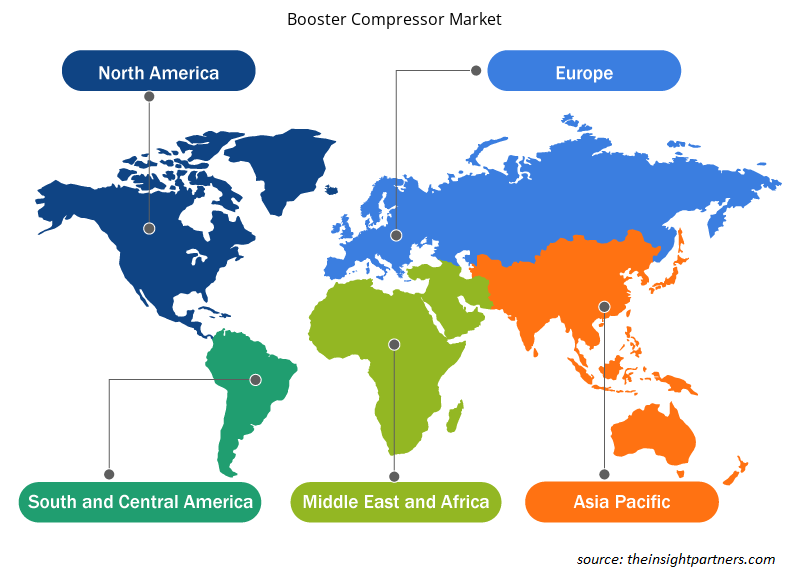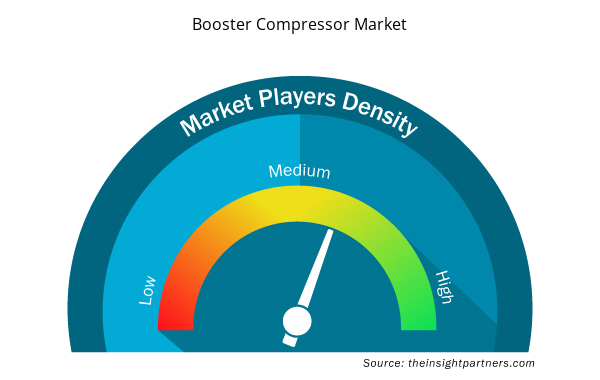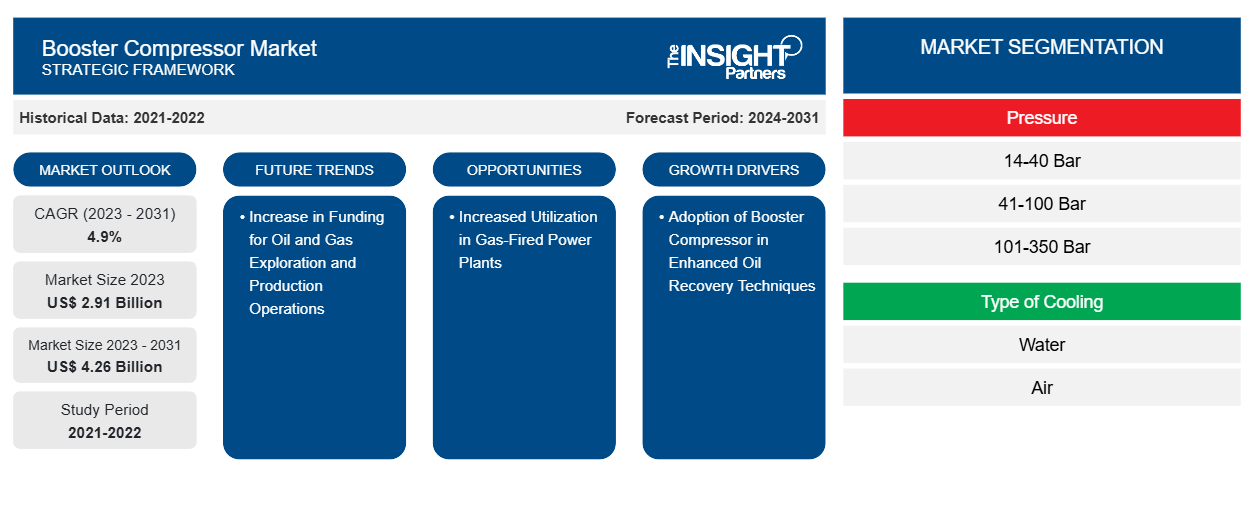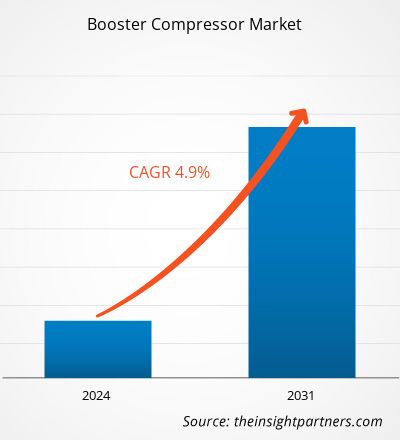Der Markt für Booster-Kompressoren soll von 2,91 Milliarden US-Dollar im Jahr 2023 auf 4,26 Milliarden US-Dollar im Jahr 2031 anwachsen. Der Markt soll zwischen 2023 und 2031 eine durchschnittliche jährliche Wachstumsrate (CAGR) von 4,9 % verzeichnen. Ein Anstieg der Nachfrage nach tragbaren Boostern und eine Erhöhung der Finanzierung für die Öl- und Gasexploration und -produktion dürften weiterhin ein wichtiger Trend auf dem Markt für Booster-Kompressoren bleiben.CAGR of 4.9% in 2023–2031. A rise in the demand for portable boosters and an increase in funding for oil and gas exploration and production operations is likely to remain a key booster compressor market trend.
Booster-Kompressor-Marktanalyse
Der Markt für Booster-Kompressoren dürfte in naher Zukunft aufgrund der weltweiten Ausweitung industrieller Projekte und der steigenden Nachfrage nach Erdgas für verschiedene Zwecke schnell wachsen. Dieses Wachstum dürfte zu einer Zunahme von Gaspipeline-Projekten führen. Die deutliche Weiterentwicklung der Endverbrauchssektoren, darunter Öl und Gas, Bergbau, Fertigung, Bauwesen, Automobil und andere, treibt die Expansion der Booster-Kompressor-Industrie voran. Darüber hinaus trägt der steigende Bedarf an Booster-Kompressoren in industriellen Tests zum globalen Wachstum des Marktes bei.
Booster-Kompressor-Marktübersicht
Ein Booster-Kompressor ist ein spezielles Gerät, das den Systemdruck erhöht, normalerweise vier- bis sechsmal höher als der Druck, der von Standardfabrikgeräten erzeugt wird. Aufgrund der potenziellen Schwierigkeiten und Kosten, die mit der Aufrechterhaltung eines derart erhöhten Druckniveaus verbunden sind, verwenden die meisten Unternehmen einen Booster-Kompressor nur vorübergehend. Obwohl er zum Betrieb von Geräten verwendet werden kann, wird er am häufigsten zu Testzwecken eingesetzt. Während die meisten dieser Kompressoren pneumatisch oder luftbetrieben sind, nutzen einige auch alternative Energiequellen.
Passen Sie diesen Bericht Ihren Anforderungen an
Sie erhalten kostenlos individuelle Anpassungen an jedem Bericht, einschließlich Teilen dieses Berichts oder einer Analyse auf Länderebene, eines Excel-Datenpakets sowie tolle Angebote und Rabatte für Start-ups und Universitäten.
- Holen Sie sich die wichtigsten Markttrends aus diesem Bericht.Dieses KOSTENLOSE Beispiel umfasst eine Datenanalyse von Markttrends bis hin zu Schätzungen und Prognosen.
Treiber und Chancen auf dem Booster-Kompressor-Markt
Einführung eines Booster-Kompressors in verbesserten Ölrückgewinnungstechniken zur Förderung des Marktes
Die Erdgasindustrie konzentriert sich zunehmend auf die Erschließung technologisch anspruchsvollerer unkonventioneller Gasreserven wie Schiefergestein, dichter Sand und Kohleflözgas. Dies hat zur Nutzung von unter Druck stehendem Gas während der verbesserten Ölgewinnung (Enhanced Oil Recovery, EOR) und der sekundären Gewinnungsphase der Rohölproduktion geführt, um den Druck innerhalb der Formation zu erhöhen und die Produktivität der Bohrung zu steigern. Infolgedessen werden zu diesem Zweck Kompressoren mit einer Leistung von 1040 bis 3900 PS eingesetzt, was die Nachfrage im Öl- und Gassektor ankurbelt.coalbed methane. This has led to the utilization of pressurized gas during the enhanced oil recovery (EOR) and secondary recovery phases of crude production to increase the pressure within the formation and stimulate well productivity. As a result, compressors ranging from 1040 to 3900 horsepower are being used for this purpose, thereby driving the demand in the
Auslastungssteigerung bei Gaskraftwerken – eine Chance für den Markt
Die Nachfrage nach Booster-Kompressoren steigt aufgrund der Umstellung von Kohlekraftwerken auf Erdgaskraftwerke zur Stromerzeugung. Deutschland hat beispielsweise ein Gesetz zur Beendigung der Kohleverstromung bis 2038 verabschiedet, und viele Länder weltweit investieren in Erdgaskraftwerksprojekte. Gasturbinen in diesen Kraftwerken benötigen einen bestimmten Druck an Brenngas, um es vor der Verbrennung mit Druckluft zu verbinden. Infolgedessen ist die Nachfrage nach Kompressoren gestiegen, da Gasturbinen höhere Brenngasdrücke benötigen, um eine bessere Leistungseffizienz zu erreichen. Darüber hinaus schwankt der Pipeline-Druck aufgrund der erhöhten Spitzennachfrage und des Gesamtbedarfs. Diese weltweite Umstellung auf kohlenstoffarme Energiequellen treibt die Marktnachfrage nach Boostern im Prognosezeitraum an.
Segmentierungsanalyse des Booster-Kompressor-Marktberichts
Wichtige Segmente, die zur Ableitung der Marktanalyse für Booster-Kompressoren beigetragen haben, sind Druck, Kühlungsart, Kompressionsstufe und Branche.
- Basierend auf dem Druck ist der Markt segmentiert in 14-40 Bar,41–100 Bar, 101–350 Bar und >350 Bar. Das Segment 41–100 Bar hatte im Jahr 2023 einen beträchtlichen Marktanteil.
- Basierend auf der Art der Kühlung wird der Markt in Wasser und Luft unterteilt. Das Wassersegment wird voraussichtlich im Jahr 2023 einen erheblichen Marktanteil haben.
- Basierend auf der Kompressionsstufe wird der Markt in Einzel-, Doppel- und Mehrfachkompressionsstufen unterteilt. Das Einzelsegment dürfte im Jahr 2023 einen erheblichen Marktanteil halten.
- Basierend auf der Branchenvertikale ist der Markt in Fertigung, Chemie, Öl und Gas, Energie und Strom und andere segmentiert. Das Fertigungssegment hatte im Jahr 2023 einen beträchtlichen Marktanteil.
Booster-Kompressor Marktanteilsanalyse nach Geografie
Der geografische Umfang des Marktberichts für Booster-Kompressoren ist hauptsächlich in fünf Regionen unterteilt: Nordamerika, Asien-Pazifik, Europa, Naher Osten und Afrika sowie Südamerika/Süd- und Mittelamerika.
In Europa wird ein erheblicher Anstieg der Stromnachfrage erwartet, der durch die zunehmende Nutzung von Hochdruck-Industriegasen in Sektoren wie Stahl, Öl und Gas, Metall und Bergbau sowie Fertigung und Verarbeitung bedingt ist. Dieser Nachfrageanstieg auf dem europäischen Markt wird voraussichtlich zu einem jährlichen Wachstum der Erdgasnachfrage von 1,5 % zwischen 2019 und 2025 führen, wie die Internationale Energieagentur (IEA) angibt. Im Jahr 2019 importierte Europa eine erhebliche Menge an LNG, nämlich 108 Milliarden Kubikmeter (bcm), was 27 % der gesamten Gasimporte ausmachte, wie aus dem Bericht der Europäischen Kommission (EK) zum Gasmarkt hervorgeht. Darüber hinaus werden 22 % des europäischen Gasverbrauchs dem Spotmarkt zugeschrieben und erfordern keine Investitionen kleinerer Akteure, was die Nachfrage auf dem Markt in der Region weiter antreibt.
Regionale Einblicke in den Booster-Kompressor-Markt
Die regionalen Trends und Faktoren, die den Booster-Kompressor-Markt während des Prognosezeitraums beeinflussen, wurden von den Analysten von Insight Partners ausführlich erläutert. In diesem Abschnitt werden auch die Booster-Kompressor-Marktsegmente und die Geografie in Nordamerika, Europa, im asiatisch-pazifischen Raum, im Nahen Osten und Afrika sowie in Süd- und Mittelamerika erörtert.

- Erhalten Sie regionale Daten zum Booster-Kompressor-Markt
Umfang des Marktberichts zu Booster-Kompressoren
| Berichtsattribut | Details |
|---|---|
| Marktgröße im Jahr 2023 | 2,91 Milliarden US-Dollar |
| Marktgröße bis 2031 | 4,26 Milliarden US-Dollar |
| Globale CAGR (2023 - 2031) | 4,9 % |
| Historische Daten | 2021-2022 |
| Prognosezeitraum | 2024–2031 |
| Abgedeckte Segmente | Durch Druck
|
| Abgedeckte Regionen und Länder | Nordamerika
|
| Marktführer und wichtige Unternehmensprofile |
|
Dichte der Marktteilnehmer für Booster-Kompressoren: Auswirkungen auf die Geschäftsdynamik verstehen
Der Markt für Booster-Kompressoren wächst rasant, angetrieben durch die steigende Nachfrage der Endnutzer aufgrund von Faktoren wie sich entwickelnden Verbraucherpräferenzen, technologischen Fortschritten und einem größeren Bewusstsein für die Vorteile des Produkts. Mit steigender Nachfrage erweitern Unternehmen ihr Angebot, entwickeln Innovationen, um die Bedürfnisse der Verbraucher zu erfüllen, und nutzen neue Trends, was das Marktwachstum weiter ankurbelt.
Die Marktteilnehmerdichte bezieht sich auf die Verteilung der Firmen oder Unternehmen, die in einem bestimmten Markt oder einer bestimmten Branche tätig sind. Sie gibt an, wie viele Wettbewerber (Marktteilnehmer) in einem bestimmten Marktraum im Verhältnis zu seiner Größe oder seinem gesamten Marktwert präsent sind.
Die wichtigsten auf dem Booster-Kompressor-Markt tätigen Unternehmen sind:
- Atlas Copco AB
- Baker Huges (General Electric)
- BAUER COMP Holding GmbH
- Boge Kompressoren
- Corken, Inc.
- Gardner Denver, Inc.
Haftungsausschluss : Die oben aufgeführten Unternehmen sind nicht in einer bestimmten Reihenfolge aufgeführt.

- Überblick über die wichtigsten Akteure auf dem Booster-Kompressor-Markt
Neuigkeiten und aktuelle Entwicklungen zum Booster-Kompressor-Markt
Der Markt für Booster-Kompressoren wird durch die Erhebung qualitativer und quantitativer Daten nach Primär- und Sekundärforschung bewertet, die wichtige Unternehmensveröffentlichungen, Verbandsdaten und Datenbanken umfasst. Im Folgenden finden Sie eine Liste der Entwicklungen auf dem Markt:
- Die Technologie von Hycomp Inc. ist Teil der Atlas Copco Group geworden. Das Unternehmen entwickelt, produziert, verkauft und wartet spezielle ölfreie Hochdruckkompressoren und Booster für eine Vielzahl von Branchen.
(Quelle: Atlas Copco AB, Pressemitteilungen, 2024)
Marktbericht zu Booster-Kompressoren – Abdeckung und Ergebnisse
Der Bericht „Marktgröße und Prognose für Booster-Kompressoren (2021–2031)“ bietet eine detaillierte Analyse des Marktes, die die folgenden Bereiche abdeckt:
- Marktgröße und Prognose auf globaler, regionaler und Länderebene für alle wichtigen Marktsegmente, die im Rahmen des Projekts abgedeckt sind
- Marktdynamik wie Treiber, Beschränkungen und wichtige Chancen
- Wichtige Zukunftstrends
- Detaillierte PEST/Porters Five Forces- und SWOT-Analyse
- Globale und regionale Marktanalyse mit wichtigen Markttrends, wichtigen Akteuren, Vorschriften und aktuellen Marktentwicklungen
- Branchenlandschaft und Wettbewerbsanalyse, einschließlich Marktkonzentration, Heatmap-Analyse, prominenten Akteuren und aktuellen Entwicklungen
- Detaillierte Firmenprofile
- Historische Analyse (2 Jahre), Basisjahr, Prognose (7 Jahre) mit CAGR
- PEST- und SWOT-Analyse
- Marktgröße Wert/Volumen – Global, Regional, Land
- Branche und Wettbewerbsumfeld
- Excel-Datensatz



Report Coverage
Revenue forecast, Company Analysis, Industry landscape, Growth factors, and Trends

Segment Covered
This text is related
to segments covered.

Regional Scope
North America, Europe, Asia Pacific, Middle East & Africa, South & Central America

Country Scope
This text is related
to country scope.
Häufig gestellte Fragen
The market is expected to reach US$ 4.26 billion by 2031.
The key players holding significant shares in the market are Atlas Copco AB, Baker Huges (General Electric), BAUER COMP Holding GmbH, Boge Kompressoren, and Corken, Inc.
Increase in funding for oil and gas exploration and production operations is anticipated to play a significant role in the market in the coming years.
The adoption of booster compressors in enhanced oil recovery techniques and the rise in the demand for portable boosters are the major factors that propel the market.
The market was estimated to be US$ 2.91 billion in 2023 and is expected to grow at a CAGR of 4.9% during the period 2023 - 2031.
Trends and growth analysis reports related to Electronics and Semiconductor : READ MORE..
The Insight Partners performs research in 4 major stages: Data Collection & Secondary Research, Primary Research, Data Analysis and Data Triangulation & Final Review.
- Data Collection and Secondary Research:
As a market research and consulting firm operating from a decade, we have published and advised several client across the globe. First step for any study will start with an assessment of currently available data and insights from existing reports. Further, historical and current market information is collected from Investor Presentations, Annual Reports, SEC Filings, etc., and other information related to company’s performance and market positioning are gathered from Paid Databases (Factiva, Hoovers, and Reuters) and various other publications available in public domain.
Several associations trade associates, technical forums, institutes, societies and organization are accessed to gain technical as well as market related insights through their publications such as research papers, blogs and press releases related to the studies are referred to get cues about the market. Further, white papers, journals, magazines, and other news articles published in last 3 years are scrutinized and analyzed to understand the current market trends.
- Primary Research:
The primarily interview analysis comprise of data obtained from industry participants interview and answers to survey questions gathered by in-house primary team.
For primary research, interviews are conducted with industry experts/CEOs/Marketing Managers/VPs/Subject Matter Experts from both demand and supply side to get a 360-degree view of the market. The primary team conducts several interviews based on the complexity of the markets to understand the various market trends and dynamics which makes research more credible and precise.
A typical research interview fulfils the following functions:
- Provides first-hand information on the market size, market trends, growth trends, competitive landscape, and outlook
- Validates and strengthens in-house secondary research findings
- Develops the analysis team’s expertise and market understanding
Primary research involves email interactions and telephone interviews for each market, category, segment, and sub-segment across geographies. The participants who typically take part in such a process include, but are not limited to:
- Industry participants: VPs, business development managers, market intelligence managers and national sales managers
- Outside experts: Valuation experts, research analysts and key opinion leaders specializing in the electronics and semiconductor industry.
Below is the breakup of our primary respondents by company, designation, and region:

Once we receive the confirmation from primary research sources or primary respondents, we finalize the base year market estimation and forecast the data as per the macroeconomic and microeconomic factors assessed during data collection.
- Data Analysis:
Once data is validated through both secondary as well as primary respondents, we finalize the market estimations by hypothesis formulation and factor analysis at regional and country level.
- Macro-Economic Factor Analysis:
We analyse macroeconomic indicators such the gross domestic product (GDP), increase in the demand for goods and services across industries, technological advancement, regional economic growth, governmental policies, the influence of COVID-19, PEST analysis, and other aspects. This analysis aids in setting benchmarks for various nations/regions and approximating market splits. Additionally, the general trend of the aforementioned components aid in determining the market's development possibilities.
- Country Level Data:
Various factors that are especially aligned to the country are taken into account to determine the market size for a certain area and country, including the presence of vendors, such as headquarters and offices, the country's GDP, demand patterns, and industry growth. To comprehend the market dynamics for the nation, a number of growth variables, inhibitors, application areas, and current market trends are researched. The aforementioned elements aid in determining the country's overall market's growth potential.
- Company Profile:
The “Table of Contents” is formulated by listing and analyzing more than 25 - 30 companies operating in the market ecosystem across geographies. However, we profile only 10 companies as a standard practice in our syndicate reports. These 10 companies comprise leading, emerging, and regional players. Nonetheless, our analysis is not restricted to the 10 listed companies, we also analyze other companies present in the market to develop a holistic view and understand the prevailing trends. The “Company Profiles” section in the report covers key facts, business description, products & services, financial information, SWOT analysis, and key developments. The financial information presented is extracted from the annual reports and official documents of the publicly listed companies. Upon collecting the information for the sections of respective companies, we verify them via various primary sources and then compile the data in respective company profiles. The company level information helps us in deriving the base number as well as in forecasting the market size.
- Developing Base Number:
Aggregation of sales statistics (2020-2022) and macro-economic factor, and other secondary and primary research insights are utilized to arrive at base number and related market shares for 2022. The data gaps are identified in this step and relevant market data is analyzed, collected from paid primary interviews or databases. On finalizing the base year market size, forecasts are developed on the basis of macro-economic, industry and market growth factors and company level analysis.
- Data Triangulation and Final Review:
The market findings and base year market size calculations are validated from supply as well as demand side. Demand side validations are based on macro-economic factor analysis and benchmarks for respective regions and countries. In case of supply side validations, revenues of major companies are estimated (in case not available) based on industry benchmark, approximate number of employees, product portfolio, and primary interviews revenues are gathered. Further revenue from target product/service segment is assessed to avoid overshooting of market statistics. In case of heavy deviations between supply and demand side values, all thes steps are repeated to achieve synchronization.
We follow an iterative model, wherein we share our research findings with Subject Matter Experts (SME’s) and Key Opinion Leaders (KOLs) until consensus view of the market is not formulated – this model negates any drastic deviation in the opinions of experts. Only validated and universally acceptable research findings are quoted in our reports.
We have important check points that we use to validate our research findings – which we call – data triangulation, where we validate the information, we generate from secondary sources with primary interviews and then we re-validate with our internal data bases and Subject matter experts. This comprehensive model enables us to deliver high quality, reliable data in shortest possible time.


 Holen Sie sich ein kostenloses Muster für diesen Bericht
Holen Sie sich ein kostenloses Muster für diesen Bericht